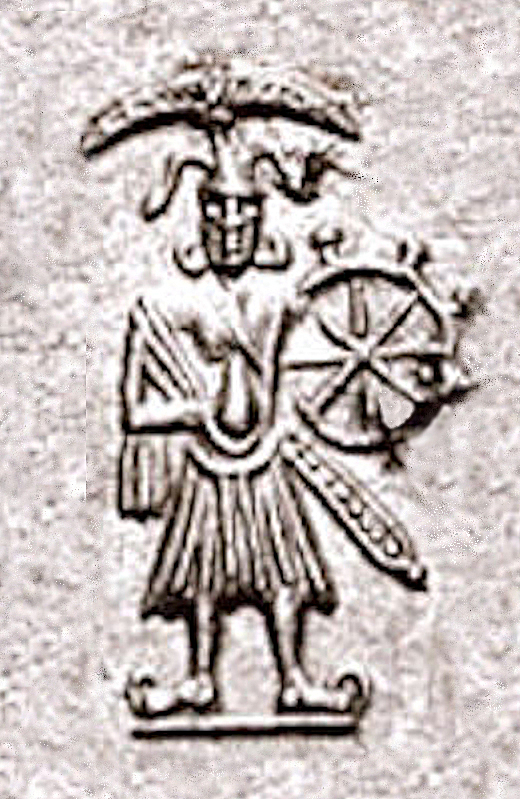|
Para-Vasudeva
''Para-Vasudeva'' () is a term found in the Vaishnavism tradition of Hinduism. It refers to the supreme and transcendental form of God, from which all of his manifestations emerge. The ''shakti'' (divine energy) of this form of God is regarded to contribute to the ''avataras,'' the material appearances of the deity on earth. Description The four '' vyuha''s (emanations) of Vasudeva are regarded to have emerged from Para-Vasudeva, identified with Vishnu, of which Vāsudeva is described to possess the full measure of the six ''guna''s (qualities) of '' jnana'', '' aishvarya'', ''shakti'', ''bala'', '' virya'', and ''tejas,'' while Samkarshana, Pradyumna, and Aniruddha possessed only two of these qualities in turn. In the Puranic tradition, Vāsudeva is identified with Krishna, Samkarshana with Balarama, Pradyumna with the son of Krishna from his chief consort Rukmini, and Aniruddha as the son of Pradyumna. Para-Vasudeva is described to will his consort, Sri-Lakshmi, in her aspect ... [...More Info...] [...Related Items...] OR: [Wikipedia] [Google] [Baidu] |
Vāsudeva
Vāsudeva (; ), later incorporated as Vāsudeva-Krishna (, "Krishna, son of Vasudeva Anakadundubhi, Vasudeva"),"While the earliest piece of evidence do not yet use the name Krsna...." in At the time of the Heliodorus pillar dedication to Vāsudeva in 115 BCE: "The real question, however, remains: was Vãsudeva already identified with Krsna?" Krishna-Vāsudeva or simply Krishna, was the son of Vasudeva Anakadundubhi, king of the Vrishnis in the region of Mathura. He was a leading member of the legendary Vrishni heroes, and may well have been a historical ruler in the region of Mathura.Vāsudeva and Krishna "may well have been kings of this dynasty as well" in Vaishnavism, Vāsudevism arose with the decline of Vedism in India, which occurred during the 8th to 6th century BCE. Vāsudeva then became the object of one of the earliest forms of personal deity worship in India, and is attested from around the 4th century BCE. At that time, Vāsudeva was already considered as a deity, ... [...More Info...] [...Related Items...] OR: [Wikipedia] [Google] [Baidu] |
Svayam Bhagavan
Svayam Bhagavan (; roughly: "God Itself") is a Sanskrit concept in Hinduism, referring to the absolute representation of Bhagavan (the title "Lord" or "God") as the Supreme God (Hinduism), Supreme God in a monotheistic framework. The concept is most commonly (but not always) associated with a male deity, for instance in Hindu sub-movements like Krishnaism and Gaudiya Vaishnavism, in which Krishna is regarded as Svayam Bhagavan. Description As stated in the ''Bhagavata Purana'', Vishnu appeared before Vasudeva and Devaki in his divine original Chaturbhuja, four-armed form before being born as Krishna. After worshipping Vishnu, Vasudeva and Devaki asked him to conceal his heavenly appearance. Vishnu complied by changing into his infant form of Krishna. ''Svayam Bhagavan'' is a term most often used in ''Gaudiya Vaishnavism, Gaudiya Vaishnava'' and other Krishna-centered theologies, and that title is used there exclusively to designate Krishna, there being conflicting semantics ... [...More Info...] [...Related Items...] OR: [Wikipedia] [Google] [Baidu] |
Vaisnavism
Vaishnavism () ), also called Vishnuism, is one of the major Hindu traditions, that considers Vishnu as the sole supreme being leading all other Hindu deities, that is, '' Mahavishnu''. It is one of the major Hindu denominations along with Shaivism, Shaktism, and Smartism. Its followers are called Vaishnavites or ''Vaishnava''s (), and it includes sub-sects like Krishnaism and Ramaism, which consider Krishna and Rama as the supreme beings respectively. According to a 2020 estimate by The World Religion Database (WRD), hosted at Boston University’s Institute on Culture, Religion and World Affairs (CURA), Vaishnavism is the largest Hindu sect, constituting about 399 million Hindus. The ancient emergence of Vaishnavism is unclear, and broadly hypothesized as a fusion of various regional non-Vedic religions with worship of Vishnu. It is considered a merger of several popular non-Vedic theistic traditions, particularly the Bhagavata cults of Vāsudeva-Krishna and '' Gopal ... [...More Info...] [...Related Items...] OR: [Wikipedia] [Google] [Baidu] |


